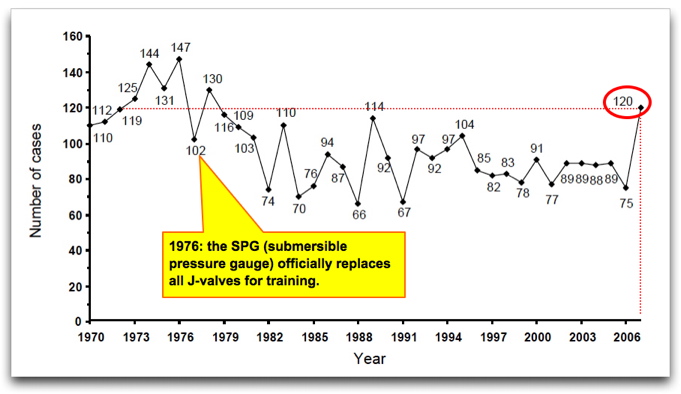That is why I would leave such an incident listed as a mishap that occurred while diving and sub-categorized as a non diving related medical issue.
Not necessarily so.
Jerome H. Modell, MD, US Navy, retired, professor emeritus from University of Florida, is arguably the single most respected medical professional in the United States regarding drownings. Modell has published over 200 papers and written many chapters in medical books and has consulted in more drowning deaths than any other MD in the USA.
Modell co-authored a paper in 2005, calling for a global redefinition of drowning. Per Modell, having ones airway submerged in water, and fighting to keep ones airway open, can have complex interrelationships with cardiac failure caused by
laryngospasm reaction to water spray that causes a lack of oxygen, and then cardiac failure,
even for healthy young divers.
A new definition of drowning: towards documentation and prevention of a global public health problem. Modell et al cite Modells earlier papers and conclude that
to ignore the impact of submergence results in faulty and less-inclusive findings.
Caruso et al have cited an earlier paper by Modell:
Drowning Without Aspiration: Is This an Appropriate Diagnosis? In this earlier paper, Modells elliptical logic may lead coroners to conclude a death by coronary condition vs. drowning verdict. Modell's more recent "New Definition" paper rectifies this confusion. Nevertheless, in Modell's earlier paper he wrote:
Unfortunately, there is no specific, conclusive test to diagnose drowning as a cause of death. Modell concludes:
causes of sudden death, such as cardiac standstill, lethal arrhythmias, or coronary artery spasm can not be confirmed anatomically after death.
The takeaway? It's too convenient, as some have said in past tragedies, to claim that the coronary failure would likely happen sometime soon anyway. Does current dive training make crystal clear that once you're immersed, aspirating even a small amount of water can start a cascade of events? Is it worth using a snorkel to save a little tank air? Personally, I surface-swim on my back. Should there be more emphasis for new divers to inspect tie-wraps on mouthpieces? Some tie-wraps are made from polymers without a UV blocking agent -- they can get brittle in a few months.
Yes, we should all maintain a level of fitness appropriate for the conditions. But during a time when
many repeated the old saying, "Diving is as safe as bowling," dive deaths reported by DAN in 2007 spiked 60% from 2006, hitting a 30-year peak. This was the worst year-to-year % jump in 20-years. (Per DAN's
2008 annual report on dive fatalities, for 2007 accidents).
Is the industry inviting more problems?
DANs 2008 report reveals a what appears to be a contradiction:
❉ Pages 9 to 11 calls for increased personal responsibility and aerobic fitness: It is the responsibility of the diver to ensure that he or she is ready for whatever diving is to be undertaken.
BUT then, a footnote buried on a back page...
❉ Page 122 cites a medical paper published by DANs sister organization, the UHMS, available only to medical professionals and students who belong to the UHMS:
"Pollock NW. Aerobic fitness and underwater diving. Diving Hyperb Med. 2007; 37(3): 118-124. Physical fitness is necessary to ensure that the normal and emergent needs of diving can be met. Reserves of both strength and aerobic capacity are important. Aerobic capacity (aerobic fitness or VO2 max) is defined as the maximum amount of oxygen that can be consumed per unit time. Alternatively, it
can be described as metabolic equivalents (MET), dimensionless multiples of the oxygen consumption of assumed resting metabolic rate (3.5 mL⋅kg-1⋅min-1), yielding a range of 5-25 MET in the healthy population.
A minimum capacity as high as 13 MET has been proposed for diving qualification. While limited, the available research data suggest that this is an unrealistically high threshold. A minimum capacity in the range of 7-10 MET may be more appropriate. Recognizing the importance of physical fitness and the decline associated with normal aging, training programs should promote awareness of the problems and risks that may be associated with low levels of fitness and the benefits of enhanced fitness. Training to understand and increase aerobic capacity should be encouraged."
Having said all that, we just don't know why this tragedy occurred. The victim may have been highly experienced and it was just her time. I've introduced some new data that probably few on ScubaBoard were aware of - I hope doing so may prevent tragedies as the season progresses. I pray Ms. Strickland's family finds peace through this difficult time.




